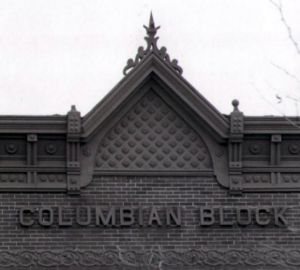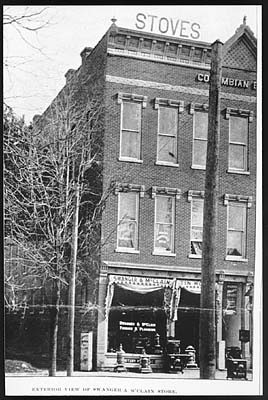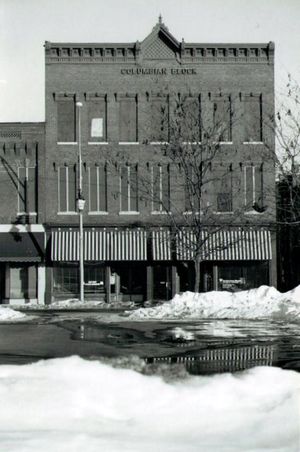Columbian Block
Contents
The Swanger & McClain Company
Phillip St. John Charles
Of the many occupants of the Columbian Block, Philip St. John Charles resided in the building longer than any other. Mr. Charles first held his offices in the building in the year of 1900. He was engaged in many different organizations throughout his life. He was a prominent real estate agent, managing several fanns. He was also associated with the Hoosier Stove Company, and several family-owned businesses in Grant County. Upon his death, Mr. Charles willed the Columbian Block to his alma mater, DePauw University.
Marion Business College
The Marion Business College began its operations in the Columbian Block immediately after the completion of the structure. Mr. J. D. Brunner became the sole proprietor in 1896, conducting the institution with his wife until 1902 (History of Grant County, Indiana). Many of the prominent businessmen of Marion received their training under the instruction of Mr. and Mrs. Brunner. In 1902, Mr. Charles C. Cring founded the idea of a chain of schools. After interesting Mr. Brunner in the project, they began working under the name Indiana Business College and eventually embraced thirteen business colleges in the Hoosier State.
Professor Jay Dee Brunner, president of the Marion Business College, was born in Stratford, Canada, October 5, 1861. He was the fourth of fifteen children born to Jacob and Dora Brunner, who were born in Germany. Mr. Brunner was educated in the common schools and the high school of Marble Rock, Iowa. He was then further schooled at the Davenport Business College in Davenport, Iowa, where he graduated in August 1884. From 1884-1889, he received post-graduate schooling at Cedar Rapids Business College and Doane College in Crete, Nebraska. For the next five years, Mr. Brunner taught shorthand and commercial branches in the Business College at Lincoln, Nebraska (Biographical Memoirs of Grant County. Indiana). In 1893, Mr. Brunner moved to Marion, Indiana, and established the Marion Business College. In politics, Mr. Brunner was a strong Republican, and when he had the time was very active in his support for the party. When young, J. D. Brunner was a delegate to several Republican county conventions. He was a member of the Independent Order of Foresters, and in this order, he used his best efforts to promote harmony and unity of action and to otherwise advance and increase the usefulness of the brotherhood (Biographical Memoirs of Grant County. Indiana).
In 1902, Mr. Charles C. Cring became the founder of Indiana Business College starting in Marion. In the summer of 1902, other schools were organized in Kokomo, Elkhart, and Logansport. Desiring to become a corporation, the school operators drew up “Articles of Association” which were filed with the Indiana Secretary of State. A Certificate of Corporation was issued to the business college in early 1903 (Indiana Business College). A key to the schools’ success was Mr. Cring’s recognition that not all people learn at the same rate. Therefore, in the major subjects, he allowed each person to go through the courses in accordance with their previous education. When each of the students completed the program to the best of their ability, they were qualified for responsible positions as stenographers, bookkeepers, secretaries, accountants, payroll clerks, machine operators, auditors, and general business assistants (Indiana Business College). From 1903-1906, after the schools in Kokomo, Elkhart, and Logansport began to serve their areas, schools were organized in Muncie, Anderson, Lafayette, Columbus, Richmond, and Indianapolis. Near the end of 1906, the stockholders petitioned the State of Indiana to permit and increase of $35,000 in the capital stock, bringing the total to $60,000 (Indiana Business College). The expansion of the Indiana Business College continued in 1908 with the organization of schools in New Castle, Vincennes, Washington, and Crawfordsville. With a total of thirteen schools throughout the state by 1906, it was decided that a general office should be opened in Indianapolis. During the years to follow, there were various changes in the directors of the corporation; several of the smaller schools in the state were closed, and new personnel brought into management and operation of the various schools (Indiana Business College).
Wallace Music Company
The Wallace Music Company began business in 1890 and eventually moved into the Columbian Block in 1905. The Wallace Music Company was of the finest in the state, handling all kinds of musical instruments and sheet music. In the department, the best line of high quality pianos in this section of the country could be found. The company also carried a large line of organs and any classical or popular sheet music. Phonographs could also be found in large numbers here and a complete selection of the latest records were always kept in stock (Grant County and Who’s Who).
From the date of its organization, Grant County has been continuously honored and benefited by the presence within her borders of the Wallace family (History of Grant County. Indiana). John Milton Wallace was born in Marion on May 9, 1853 to Judge John M. and Mariam C. (Weeks) Wallace. After completing his schoolwork in 1871, he moved to St. Louis, where he began his early career in newspaper (Biographical Memoirs of Grant County, Indiana). In 1874, he returned to Marion and bought the interest of his younger brother, J.L., in the Marion Democrat, where he continued as one of the editors and publishers until 1879 (Biographical Memoirs of Grant County. Indiana). “Messrs.” Kitch and Vaughn originally began the Marion Democrat in 1871. In the fall of 1873, the Wallace Brothers bought the Marion Democrat from “Messrs.” Kitch and Vaughn. In 1874, they were offered $2,500 for the office, and a few days after the offer was made, the destructive fire, which swept away Sweetser’s Bank, and every other building upon the ground consumed all their presses and printing materials (Biographical Memoirs of Grant County, Indiana). This was a total loss to the Wallaces, having no insurance on the office. With the help of the many friends of the Marion Democrat, the newspaper reappeared in a building of its own on the east side of the public square in 1879 (History of Grant County. Indiana). With the return of the paper, L. A. Wallace became the sole proprietor, and under his management the paper continued as a fearless advocate of the principles of the Democratic Party (History of Grant County. Indiana). After his time with the Marion Democrat. J.M. Wallace became involved with such other jobs as an insurance agent, vice-president and general manager of the State Loan Association, and an employee at the Indianapolis Daily Sentinel (Biographical Memoirs of Grant County, Indiana). In 1896, J.M. Wallace started the Wallace Music Company at 103 S. Washington St. and later moved to the Columbian Block in 1905.
Conclusion
The Columbian Block, like many of the other buildings in downtown Marion, has remained a beautiful part of the community for over a 100 years. The establishments operated inside the building have had a significant impact on the well being of the public. The Columbian Block although not one of the most famous buildings in Marion, has played a noteworthy role in the foundation of the early Marion community.Works Cited
- Atlas of Grant County. Indiana. Chicago: Kingman Bros., 1877.
- Baldwin, Moe H. Some Greater Marion Faces. 1905.
- Biographical Memoirs of Grant County. Indiana. Chicago: Bowen, 1901.
- Denison, Inez. Manufacturers’ and Merchants’ Industrial Record of Marion, Indiana. Toledo: Toledo, St. Louis, and Western Railroad Company.
- Grant County and Who’s Who. Marion: The Special Company, 1909.
- History of Grant County, Indiana. Chicago: Brant and Fuller, 1886.
- Indiana Business College. Indianapolis: Indiana Business College, 1982.
- Nelson, David F. “Columbian Block building to undergo facelift.” Chronicle Tribune 30 Jul. 1994, Al.
- The Oueen City. Marion, 1905.
- Whitson, Rolland Lewis. Centennial History of Grant County, Indiana. Chicago: Lewis, 1914.
Credits
Lucas White submitted this paper on January 9, 2001 for Mr. Lakes' and Mr. Munn's classes at Marion High School.


